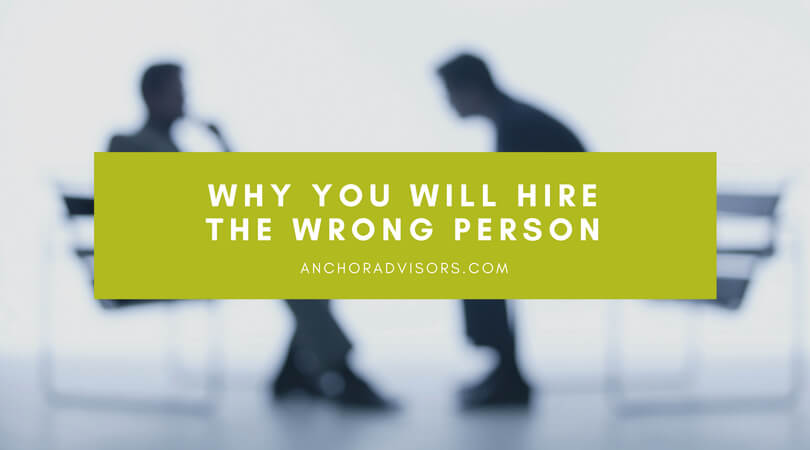Why You Will Hire The Wrong Person
One article consistently stood at the top of the list of “Most Read Articles” on the New York Times website in 2017: Why You Will Marry the Wrong Person by Alain de Botton. In it, de Botton argues that we are looking for an ideal partner (without flaw or conflict), while ignoring the fact that, as human beings, we all are deeply flawed and often a little bit crazy. In summary he says, “Marriage ends up as a hopeful, generous, infinitely kind gamble taken by two people who don’t know yet who they are or who the other might be, binding themselves to a future they cannot conceive of and have carefully avoided investigating.”

To me this sounds like the way most of us make hiring decisions...
While we’ve done a lot of work recruiting and hiring for our clients—and have a solid track record—I’ve been thinking about trying to invent a whole new way of hiring. Let’s face it; the world has changed. We can’t keep hiring like we did in 1995. There’s got to be a better way. I wonder if de Botton’s article might give us some clues about how to do that.
Any process that involves an interview where both the candidate and the hiring manager are expected to present the best version of themselves seems like it’s hopelessly flawed. We interview a candidate that seems like Idris Elba, but the employee that shows up on his first day seems more like Urkel. And why is that? Because the interview is a highly choreographed display. Sure, longer interviews make it tougher to keep the show going — but it’s still a show. The hiring team “quizzes” the candidate about work history and past behavior and tries to use the candidate’s carefully crafted answers to predict their future behavior in a new role.
But we live in a world that—more and more—values authenticity and connection. So this ritualistic dance and “putting on our best face” seems fake. It fails to build trust. And, it results in some bad hires. What could we do instead?
What if we started off writing job postings that contained less marketing language and fewer superlatives, and instead offered a realistic view of the assignment? Something along the lines of Shackleton’s job ad for his Antarctic expedition. We want to attract candidates who see that they can make a difference, but it’s not going to be easy. We’re looking for someone really talented because this is a big challenge. We don’t have everything you’ll need, we’re not perfect, and our market isn’t lying down—it’s a jungle out there. That’s why we need your help!
De Botton suggests that, “In a wiser, more self-aware society than our own, a standard question on any early dinner date would be: ‘And how are you crazy?’” The truth is that we are hiring someone new because we have a problem and we’re hoping that this candidate (or the next) will be able to solve it. Could we be more honest about our challenges, about the tools and resources available to solve it, and the difference it would make to have it solved? What if we told the truth about the ways we were a great supervisor (and the places where we might be falling short)?
We’re good at asking behavioral questions of candidates to determine what they actually accomplished and why they might have failed in past roles. What if we told the candidates, “Here’s why the last 2 people who had this role failed: it was partially them, but it was also partially me.” Would that type of candor freak people out or would it open up a whole new type of hiring conversation?
Further, instead of setting up an interview like we’re interrogating a spy, could we develop an interview process in which we collaborate with the candidate to explore some of the challenges in the role, encourage them to work with us on potential solutions, and in the process experience what it is like to work together? Of course, we’d have to figure out how to do that while maintaining some kind of “apples-to-apples” comparison of candidates; but wouldn’t that provide a whole different experience for both the hiring manger and the candidate? Instead of starting off as adversaries we could start off as collaborators!
Just like the “marriage myth”, the traditional hiring process is entrenched in our society. Changing it isn’t going to be easy. My ideas here are untested and unproven. But if you’re tired of hiring (or marrying) the wrong person, maybe you should give it a try?
If you’re curious enough to hear more about de Botton’s ideas about love, check out this extended conversation he has with Krista Tippet.
Download the Complete
Hiring Sample Bundle
Get samples of the job posting, phone screen guide, and interview guide we use daily for our job openings and clients we are recruiting for.
Get a headstart and get that new hire in the chair faster.